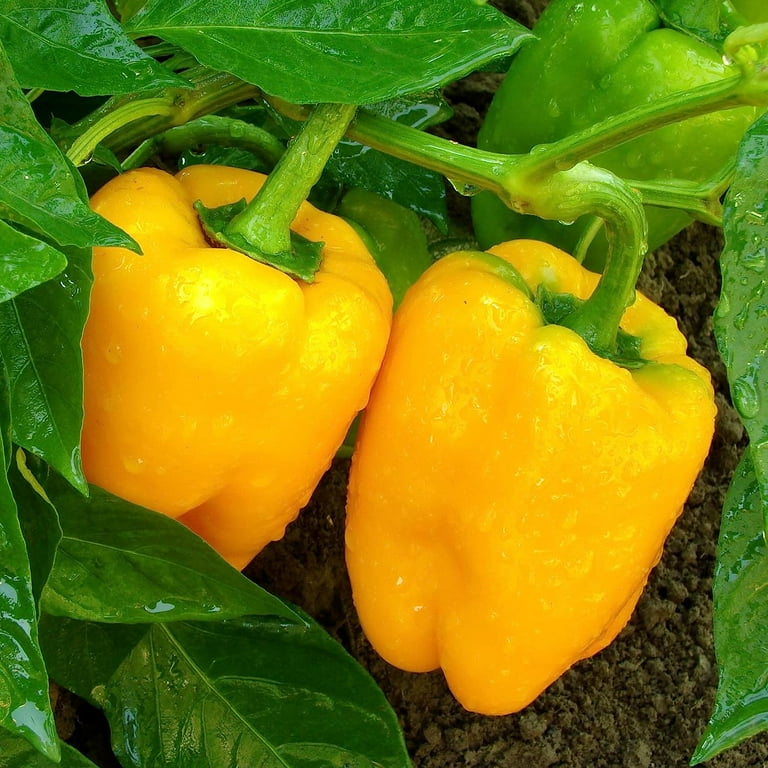Organic Vs. Synthetic Fertilizers: Which Is Best for Supporting Healthy And Balanced Pepper Plants?
In the world of supporting healthy and balanced pepper plants, the option in between organic and synthetic plant foods stands as an essential choice with far-ranging implications. While both options aim to offer necessary nutrients to sustain plant development, the subtleties of their effect on the soil, plant wellness, and the setting trigger a debate that mirrors throughout the horticulture neighborhood. Comprehending the distinct benefits and prospective mistakes of each plant food kind is critical for pepper growers seeking to optimize their returns while maintaining an eco-conscious and lasting approach.
Benefits of Organic Fertilizers
Organic fertilizers provide an environmentally-friendly and sustainable method to beneficial pepper plants, offering necessary nutrients without making use of synthetic chemicals. These all-natural plant foods are acquired from natural sources such as compost, manure, bone dish, and algae, promoting dirt health and biodiversity. Unlike artificial fertilizers, natural options release nutrients gradually, making sure a steady and well balanced supply for pepper plants to grow.
One considerable advantage of organic fertilizers is their capacity to enhance dirt structure and water retention. By improving dirt health, organic plant foods advertise useful microbial task, which aids in nutrient uptake by pepper plants. Furthermore, natural fertilizers decrease the threat of chemical run-off, protecting water sources from contamination and safeguarding the atmosphere.
In addition, organic fertilizers add to lasting soil fertility by promoting the growth of helpful dirt organisms. These organisms assist damage down natural issue, releasing nutrients in a type that is conveniently accessible to pepper plants. best fertilizers for peppers. By promoting a healthy and balanced dirt ecosystem, organic fertilizers sustain lasting pepper farming techniques that benefit both plants and the environment
Drawbacks of Synthetic Plant Foods
Synthetic fertilizers, in contrast to their natural equivalents, present different drawbacks when utilized to nourish pepper plants, impacting both plant wellness and environmental sustainability. One major downside of artificial plant foods is their tendency to leach nutrients from the dirt promptly.
In addition, the overuse of synthetic plant foods can add to water air pollution. Excess fertilizers not absorbed by plants can remove right into water bodies, causing eutrophication, where algae blossoms deplete oxygen levels in the water, hurting water life. In addition, synthetic plant foods are usually stemmed from non-renewable sources, such as nonrenewable fuel sources, contributing to carbon exhausts and ecological deterioration throughout their manufacturing.
Nutrient Absorption Contrast
Efficient nutrient absorption plays a crucial function in the overall wellness and growth of pepper plants. When contrasting artificial and natural fertilizers in regards to nutrient absorption, organic plant foods have the benefit of supplying an extra well balanced and slow-release source of nutrients (best fertilizers for peppers). Organic fertilizers contain a range of macro and trace elements that are not just valuable for the plants yet additionally promote healthy and balanced dirt microbial activity, which helps in nutrient uptake. On the various other hand, synthetic plant foods frequently provide a pop over to this web-site quick release of nutrients, which can lead to leaching and drainage, leading to lower nutrient absorption prices by the plants.
Furthermore, organic plant foods enhance soil framework and water retention ability, allowing pepper plants to access nutrients extra efficiently. This better dirt top quality assists in origin development, making it possible for far better nutrient absorption. Artificial plant foods, although at first boosting plant development due to their high nutrient focus, may impede lasting nutrient absorption by degrading soil wellness with time.
Ecological Influence Factors To Consider

On the various other hand, synthetic fertilizers, although often more promptly readily available and focused to plants, can have damaging results on the atmosphere if not used appropriately (best fertilizers for peppers). Their production needs high power inputs, resulting in greenhouse gas exhausts and contributing to climate modification. The drainage of excess synthetic plant foods can contaminate water resources, leading to eutrophication and damaging water ecological communities.
Ideal Fertilizer Practices for Peppers
To accomplish this, it is necessary to adhere to ideal plant food techniques customized to the details demands of pepper plants. One crucial practice is to carry out a soil test before using any type of fertilizers.
One more essential practice is to fertilize pepper plants at the correct time. Typically, peppers benefit from obtaining plant food at growing and after that again when they start to blossom. Over-fertilizing can cause nutrition discrepancies and hurt the plants, so it is vital to follow advised application prices.
Furthermore, choosing a well balanced plant food with an NPK ratio that suits pepper plants' needs is basic. Organic fertilizers, such as compost or manure, can be superb options as they release nutrients slowly and boost soil structure over time. Nonetheless, artificial fertilizers can provide a fast nutrient boost when needed. Inevitably, integrating artificial and organic Discover More Here plant foods judiciously can assist nurture healthy and balanced pepper plants while reducing environmental influence.
Final Thought

Organic fertilizers use a lasting and environmentally-friendly strategy to nourishing pepper plants, supplying essential nutrients without the use of artificial chemicals. Unlike synthetic fertilizers, natural alternatives release nutrients slowly, making sure a well balanced and steady supply for pepper plants to prosper.
Artificial fertilizers, in contrast to their natural equivalents, pose different negative aspects when used to nourish pepper plants, influencing both plant health and environmental sustainability. When contrasting natural and artificial fertilizers in terms of nutrient absorption, natural plant foods have the benefit of providing a more balanced and slow-release source of nutrients.In addition, organic fertilizers improve dirt framework and water retention ability, allowing pepper plants to access nutrients much more effectively.